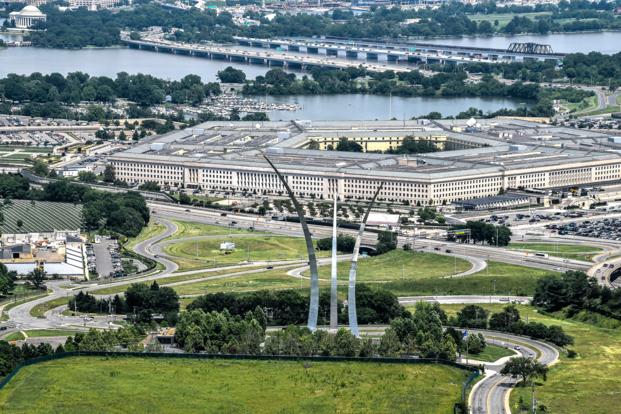It's one of the biggest proposed defense budgets in history. The largest military space budget in history. And the $842 billion spending plan unveiled Monday by the Pentagon also predicts the military's funding could reach nearly $1 trillion annually by the end of the decade, if President Joe Biden's estimates hold.
For service members, the big spending plans for fiscal 2024 could mean the largest pay hike for troops in more than 20 years, universal pre-kindergarten services for military families, better deals on groceries at the commissary, and continuing allowances for gas during permanent change of station moves.
The beefy budget is largely in response to the growing might of China, and partly to lessons learned from Ukraine, but the plans are far from a done deal. The budget proposal now goes to Congress, where lawmakers are divided over whether to bump up the already historic spending plan or slash the funding Pentagon planners want, as some House Republicans are proposing.
Read Next: 125% Increase to Space Force Bonuses Part of 2024 Budget Request that Would Grow Ranks
Overall, the budget proposal is $26 billion more than the $816 billion that the military got this year, which equals a 3.2% increase, according to released budget documents.
The boost to service member paychecks is likely to remain. Troops and civilian workers are in line to get a 5.2% basic pay raise -- the largest in more than 20 years. This year's raise was 4.6% and also notable as the biggest in a decade.
"The United States military's greatest asset is its volunteer force, and we need to ensure that our people know how much we appreciate what they do," Sen. Jack Reed, D-R.I., chairman of the Senate Armed Services Committee, said about the pay increase in a statement Monday.
The hike is tied to the Employment Cost Index and could take effect next January without any action by Congress.
The Pentagon also unveiled a plan to provide universal pre-kindergarten childhood education programs. Many four-year-old military children living at overseas locations don't have access to those programs, according to advocates.
The National Military Family Association wrote a letter to Defense Secretary Lloyd Austin in February urging him to expand the pre-K services to improve the quality of early education offered to military families. Many children are instead forced to depend on child development centers, which are overburdened and often have long waitlists, it said.
"Current Pre-K programs are unable to accommodate 80% of the eligible population of four-year-olds, with parents unable to access similar early childhood education (ECE) programs comparable to their counterparts in the continental U.S.," the group wrote in the Feb. 24 letter.
Pentagon officials also said the budget plan aims to reduce the cost of groceries at commissaries, though it provided few details on how Monday. Budget slides said it would "strengthen" the chain of stores at military installations around the world.
Austin released a statement saying the plan continues an effort to "make life a little easier by lowering everyday costs, including by reducing the cost of goods in the commissary and making child care more accessible and affordable."
Budget documents show a proposed $27 million boost to the commissary system's working capital fund -- up more than $200 million over what was spent in 2022. In October, the department infused the commissaries with funding as inflation was causing prices to rise, and that allowed the stores to reduce prices by 3% to 5%, according to the Pentagon.
China looms large over the budget proposal. Deputy Defense Secretary Kathleen Hicks said that the Pentagon is proposing the largest procurement budget in history -- buying fighter jets, bombers, ships, armored vehicles -- to keep China on its toes.
The budget also pumps about $31 billion into munitions, including ammunition and tactical and strategic missiles. The proposed buys are mostly unrelated to Ukraine, where the U.S. has sent tens of billions in weapons over the past year, and are meant to bolster capabilities in the Pacific.
"Our greatest measure of success, and the one we use around here most often, is to make sure the [People's Republic of China] leadership wakes up every day, considers the risks of progression, and concludes today's not the day," Hicks said during a briefing to reporters at the Pentagon on Monday. "And for them to think that today and every day between now and 2027, now and 2035, now and 2049, and beyond."
China's growing military and influence in the Indo-Pacific region, especially in relation to Taiwan, have become a rare point of agreement among many Republicans and Democrats. Congress has added funding above what the Pentagon requested in the past two years as the concerns over a clash with Beijing grow.
But the $842 billion budget is likely to be a big target for lawmakers looking to reduce federal spending and block Biden's agenda. The political wrangling will play out over the coming months as defense officials are called to Capitol Hill to testify and justify the spending.
"The president's request provides a valuable framework," Reed said Monday. "Over the coming weeks, the Senate Armed Services Committee will continue to hold in-depth, bipartisan hearings on the budget request with the secretary of defense, chairman of the Joint Chiefs of Staff, service secretaries, and combatant commanders as we begin constructing this year's National Defense Authorization Act."
-- Travis Tritten can be reached at travis.tritten@military.com. Follow him on Twitter @Travis_Tritten.
Related: Biggest Military Pay Raise in Decades Proposed by White House













